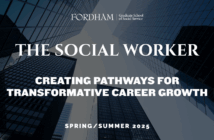“This book starts with YOU.”
That is the last line of the introduction in Making the Tough Call: Resource for Professional Reporters of Suspected Child Maltreatment, a new book written by Kathryn Krase, GSS ‘09, ‘00; LAW ‘01, to prepare US mandated reporters for the nuance and critical thinking skills needed to thrive in their profession.
With over 20+ years of experience in mandated reporting, Krase wrote Making the Tough Call to help educate and prepare reporters for the stressful experience that comes right before making a report to Child Protective Services. In doing so, she is challenging the way the system works and trains these professionals.
“This book is designed to educate students and professionals in practice across the United States about what it means to be a mandated reporter and help them consider their professional role as a mental or behavioral health professional,” her website reads.
Along with her experience in the mandated reporter space, Krase has acted as a faculty member at Fordham University, Yeshiva University, and Long Island University-Brooklyn, to name a few of many prestigious positions. She was a Stein scholar at Fordham Law School, where she received the Archibald R. Murray Public Service Award; and most recently, Krase was a Fulbright Specialist in Amman, Jordan.
We sat down to speak about her career, and she explained what key insights and ideas Making the Tough Call brings to the profession that have been needed for a long time.
Did you get your MSW and JD degrees through the GSS Dual Degree program?
Yes! I was actually the first person to do the Dual Degree Program. It has framed my career, and it was amazing.
My father is a Sociology Professor Emeritus at Brooklyn College and he’s the one who said, you know, you would definitely have a blast in law school. That’s how your brain works. I’m very type A – organized and structured. But then he says, but it’ll eat you alive. It’s just not going to be fulfilling for you in terms of what your larger goals are. So, if there’s a way for you to combine law with social work, I think that would be for you.
And I thought, well, I don’t have an interest in being a therapist. And he said, you have to look to the roots of social work, and look at where social work came from. He said, you really are aligned with the values of the social work profession.
That program was [former GSS Dean]Mary Ann Quaranta’s and I’m forever grateful for her vision. Also, [former GSS Dean]Peter Vaughan was really an amazing support to me. And I think that Dean McPhee has brought GSS into a different stratosphere. As an alumni, I feel blessed to not only have experienced Fordham so many different times, but I’m also really proud of where Fordham is now in the grand scheme of social work education.
What does Making the Tough Call bring to the Mandated Reporting field you wish you would have known before starting?
More questions than answers. Anybody who’s ever taken one of my classes will tell you that when a student asks a question, the first thing I do is ask them, what do you think the answer is? What knowledge do you have? And so much of the preparation that’s been given to mandated reporters so far has been, this is what you do; this is what you look for; this is what you write and it’s been very directive. As a result, what the system unfortunately has produced is people who can’t think for themselves.
People who are mandated reporters mean very well. They want to do the right thing, but they’re trained and prepared in a very prescriptive way. They honestly don’t think that they have choices to make. They don’t understand the nuances, and they don’t understand the complexities — because the training tells them information in such a way that makes it seem like this world is in boxes, and the world isn’t in a box.
You have to understand the nuances, and the thing that has really gotten me over the years is that mandated reporters are professionals — social workers, psychologists, other types of counselors, doctors, nurses, teachers — these aren’t line workers at a factory. We need to give them the information, but we also need to give them the leeway to be critical thinkers about the information that they’re processing. And so that’s really what this book, in particular, is about. And this particular edition is for mental and behavioral health professionals, because a lot of training doesn’t really talk about those different things. The conversation about mandated reporting needs to be different.
So, in other words, we can’t pigeonhole these professionals into a way of thinking that is only “by the book” and is unable to adapt.
Exactly. Here’s an example: There are about four and a half million reports to CPS every year, and 80+ percent of those reports are not substantiated after investigation. And then the reports that are reported are being evaluated and it’s being determined that CPS can’t intervene.
And so it really begs the question: What else can those professionals be doing other than making the report? Are they making the report because they think they have to make the report, or because there’s something going on there [worth reporting]that we need to figure out? Because 3 million families were being investigated, and there’s no evidence that they actually abused or neglected their kids.
A lot of families get a really traumatic experience when CPS calls, and it’s racially disproportionate. So, Black and Brown families are more likely to be reported; it’s a problematic system on so many different levels. As I said, I don’t have all the answers. I try not to even give the answers, but I’m trying to pose the questions and give the information I can to help people take the questions and process them the best way they can.
From your experience training these reporters, along with the ability to think critically, what are some of the characteristics or signs someone will be successful in this profession?
Mandated reporters, because they’re professionals, are afraid that they’re going to be wrong. In New York State, in order to get your license to be a social worker, you need to take the basic training that everybody else takes. And so people taking this training are newer professionals — they might not even actually be in practice, and so they’re scared on so many levels. They’re scared that they’re not going to be a good professional, they’re scared that they don’t know what they’re doing, and now on top of that we’re telling them, you have to make reports, and if you don’t make a report when you’re supposed to make a report you’re going to get in trouble.
So there’s an understanding why these new professionals are making reports that maybe they shouldn’t. So, when I’m in a room with trainees, I am most hopeful for the trainees who are not scared. But we scare them with the training. When I do trainings, if the person at the end of the training is going to make a report because they’re afraid they’re going to get in trouble if they don’t, then I haven’t done the training right. I need to provide them with the information and the skills so that whatever decision they make at the end of their call — if they’re going to make a report or not — that they are confident that they made the right decision and that they’re not afraid of what the outcome is going to be.
How has the pandemic affected child abuse reports? One of your GSS colleagues and previous co-author Ken Lau said they were down during the start of the pandemic, but that might have been because kids were not in school, where most reports happen.
Ken is completely right. There was a major plummet in the number of child abuse reporting. The good news is there was not an increase in child fatalities. A statistic that you’re going to hear a lot about is there was an increase in the number of child abuse cases identified in hospitals. And the reason for that is because they weren’t being identified in schools, and so it did show that there were missed opportunities by kids being at home instead of in school, which is the largest source of reports.
We don’t know the full picture of reports in 2020. We’re just getting the data now, because it was so different from any other year. So, of course there’s going to be the data. A lot of people in this field are hoping, regardless of which side of the work they’re on, that COVID is actually helping give us a reset.
Schools actually generally have the highest rate of unsubstantiated reports, which is kind of like a double negative. So, reports from schools are amongst those least likely to be substantiated. And there are so many of them. So, the fact that there was such a precipitous drop in those reports changed the way that CPS functioned in different jurisdictions — because the number of cases they had was lower, and therefore they got to change the way they work their cases. So, we’re going to see big changes over the next few years.
But we also know there’s going to be long term consequences from the mental health crises that were caused by COVID.
But I can see where this book would have a large part in that reset. Now we’re asking the questions to really attack the root of what’s going on.
Exactly, and our own role in the system.
I’m hoping the book will help professionals recognize what our role is, and own it. Then we have to recognize that we’re responsible for the whole system too. If we can rethink where we are in our role, then we can actually help reshape the system and improve it for the next generation.



